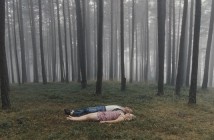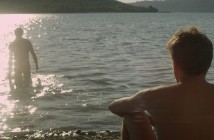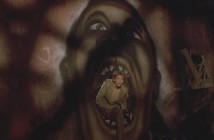A warm welcome to what might well be the best week we’ve yet had here at This Week On Demand. Where usually the latest crop of new streaming releases represents something of a mixed blessing, offering a large field of bad movies among which the vague hopes of hidden greatness may lie, this week has a startling ratio of masterpieces standing out, no fewer than one in three titles below deserving of that prestigious title. With one of those four thus far only having accumulated 9 votes on IMDb, it’s fair to say we have on our hands a vastly underseen gem, as well as a perfect blend of varying styles for all sorts of film fans; with animation, documentary world cinema, and American independent all represented with some of the finest offerings available to them, this is as good a selection as we’re ever likely to get.

Watch it here
“From the director of Saw II, III & IV” boasts the poster for 11-11-11, a horror thriller that, despite its director’s previous genre credentials, never manages to be anything more than a limp conspiracy story with very little ability to shock or scare. A bestselling author whose wife and son were recently killed in a fire started by a crazed fan, Joseph travels to Barcelona to visit his dying father and wheelchair-bound brother. An atheist in the face of his family’s staunch religious beliefs, Joseph becomes consumed with patterns of the number eleven which begin to appear in both his dreams and waking hours. Less a horror than a murky thriller, 11-11-11 nonetheless can’t hold itself back from flaccid efforts at scaring the viewer with sudden noises and silly visual jumps, a tactic that rapidly grows as weary and inefficient as the plodding characterisation and paper-thin religious commentary. AVOID IT.

Watch it here
There was a point, maybe five minutes into And Then Came Lola, when I realised that I was watching a lesbian-centric remake of Tom Tykwer’s Run Lola Run, an activity I never dared imagine I might find myself engaging in. It may sound an interesting idea, and one worth watching based on premise alone, but Ellen Seidler and Megan Siler’s efforts amount to little more than a borderline pornographic misreading of the ideas behind Tykwer’s film. Completely misusing the flashing photograph effect, And Then Came Lola sees the titular heroine racing to bring her girlfriend’s portfolio to an important meeting so that she can land a snazzy new job. Seemingly built entirely around the premise that lesbians are universally unfaithful to each other, it’s a poorly acted, poorly directed, poorly written rip-off of a much better work. With very little left to redeem it, this is a shamefully sub-par execution of a really quite fascinating idea. AVOID IT.

Watch it here
Produced by Yorgos Lanthimos of Dogtooth fame, Athina Rachel Tsangari’s Attenberg is a further feather in the cap of Greek cinema, a weird economic allegory with just as much oddity as Lanthimos’ breakthrough film. Taking its name from its protagonist Marina’s mispronunciation of David Attenborough, whose nature documentaries she obsessively watches, Attenberg takes a clinical and removed look at the fibres of human social interaction by way of this strange and introverted young woman. As Marina’s father slowly succumbs to some unnamed disease and the vast industrial structures he—an engineer—built turn to rubble, Tsangari paints a manifold portrait of modern Greece and its economic turmoil. Brilliantly played by a sublime Ariane Labed, Marina is a character as hilarious—she spends much of the film in imitation of her favourite animals—as she is oddly pitiable, her vast social ineptitude a sad reflection of the legacy left to Greek youth. MUST SEE.

Watch it here
Harmut Bitomsky’s passion for dust is most admirable, his evident dedication to providing an encompassing view of the subject shining through in this feature documentary. The problem is that one needs to bring a prior interest to the table to really be consumed by the film, and it’s an interest I dare say few share. Interesting facts and figures might be tossed around with relation to dust’s prevalence in the household and origins in stellar implosion, but presented in a series of interviews with straight-faced scientists complete with Bitomsky’s droll, dour voiceover they lose all dramatic impact they might otherwise hold. The exploration of the omnipresent infinity of dust’s existence does bring to mind an interesting cosmic juxtaposition to pass comment on our brief lives, and it’s an interesting touch that makes Dust transcend simply being an overview of a household nuisance and attain a wider relevance to each of our lives, even if it’s delivered in quite so dull a fashion. WORTH WATCHING.

Watch it here
A Blaxploitation classic, Foxy Brown casts a young Pam Grier as the titular character: a tough, no-nonsense girl who sets out to avenge the death of her boyfriend by going undercover in a prostitution ring and taking down its leaders from the inside. Bearing all the guns, girls, and gore that are to be expected from exploitation cinema, it’s a whole lot of fun held together by Grier’s fiery and feisty performance. She owns the screen throughout, emasculating her adversaries with ease and earning her place in history as one of the great female action heroes. Director Jack Hill and co. have a great deal of fun staging sticky fights and setting up Foxy as the tagline-proclaimed “meanest girl in town”, and as do we in witnessing her blood-soaked vengeance. Its production value is expectedly low, and it amounts to little that lingers long in the mind, but Foxy Brown is fondly thought of for reasons obvious to see. WORTH WATCHING.

Watch it here
What could be more exciting than a space vampire horror from the director of The Texas Chain Saw Massacre and the co-writer of Alien? Very little, you might think, yet somehow Lifeforce never quite manages to deliver on the spectacular promise names like Hooper and O’Bannon elicit. That’s not to say the finished product is a bad film, just that it feels it could have been so much more. Even so, Lifeforce makes for a decent watch, telling the story of a group of space explorers who, in the process of studying Halley’s Comet, discover a gigantic ship carrying strange creatures who appear long dead and three humans in suspended animation. What follows is a gore-heavy vampire tale with some effectively creepy moments and a terrific Patrick Stewart who completely steals the film in an excellent late scene. Heavy on the gun-toting action and low on memorable characters, Lifeforce manages to be perfectly enjoyable despite its many flaws. WORTH WATCHING.

Watch it here
A visually and sonically stunning documentary that alternates between the seemingly disparate subjects of a Chilean observatory and the grieving relatives of victims of Pinochet’s brutal regime as they search for their loved ones’ remains in the Atacama desert, Nostalgia for the Light is an accomplished and emotional voyage through time and space that brilliantly pulls together its diverging narrative strands to pass profound comment on the nature of life and our place in the world. With staggering planetary visuals set to the tune of epic classical music, it contrasts the demise of galaxies with the strife of single humans, in doing so not making their struggle seem insignificant, but rather embellishing it with cosmic comparison that magnifies the emotion. Through troubling pacing occasionally lends certain interviewees too great a deal of time, this is a sublime dramatic portrait of loss and the powerlessness it instils; a humbling confrontation of what really matters in life. MUST SEE.

Watch it here
Gus van Sant has long been a filmmaker flitting between the mainstream and the art house, hopping from Oscar-friendly fare like Good Will Hunting to slow, commercially unviable outings such as Gerry. Where his more experimental work like Gerry and Last Days tends to frustrate more than fascinate, his Palme d’Or-winner Elephant was a triumphant channelling of his newfound Béla Tarr-borrowed sensibilities into a socially relevant and emotionally ripe story. Paranoid Park is his finest film since Elephant, and perhaps the best movie he has yet made. A sombre story of a 16 year old skateboarder carrying a burning guilt, it’s a film that focuses far more on visual storytelling than on narrative, cinematographer Christopher Doyle flooding the screen with fluidly expressive visuals. Young newcomer Gabe Evans is a revelation in the lead role, conveying the burden of a heavy secret primarily without the aid of dialogue. One of the greatest achievements in the last decade of American independent cinema. MUST SEE.

Watch it here
The true story of a South Korean school for the deaf that was found to have made a practice of child abuse, Silenced tells a difficult story with an engrossing combination of reserved grace and, when the gravitas of the situation calls for it, scenes that present horrors it’s difficult to watch. Not one to shy away from depicting the tough reality that needs to be exposed, writer/director Dong-hyuk Hwang shows an admirable ferocity in confronting these crimes, a ferocity he struggles to match outside of this handful of well-staged scenes. The film’s latter half is composed primarily of courtroom sequences that, though continuing the drama adequately, do little to make themselves any different from most films which wind up playing out in trial. It’s an unfortunately average fate for a film which displayed such power previously, and while it doesn’t strip Silenced of its effect, it prevents it from reaching the level of impact it might otherwise have. RECOMMENDED.

Watch it here
Like just about every other rational person on this earth, I’m instantly enthralled by the idea of a film that follows a cycling Tilda Swinton through Germany as she quietly whispers nature facts auf Deutsch. The reality, alas, does not meet the fantasy, and Cynthia Beatt’s retracing of her and Swinton’s journey along the Berlin Wall 21 years prior is something of a self-indulgent mess. Though Beatt captures some beautiful shots of local scenery, and the image of Swinton lying in a field making strange noises and waving her limbs is one to remain in the mind for an eternity, The Invisible Frame doesn’t say a tenth as much as it seems to think it does, the ethereal voiceover verging closer to pretentious than poignant. Being just under an hour in length, it finishes before it’s had time to become irritatingly oblique, allowing it to escape the damnation that might have awaited any more of the same. SO-SO.

Watch it here
An animation of such breath-taking originality and creative brilliance as to rival recent greats like Mary and Max and A Town Called Panic, The Story of Mr. Sorry is a mesmeric odyssey of colour and shape, a stylistically loose and narratively insane wild ride that boggles the mind with its unforeseen majesty. The titular Mr. Sorry is a lowly ear cleaner whose inefficiency at his job threatens his ability to handle the expensive bills he receives from a detective agency tasked with tracking down his missing sister. A crack team of five directors somehow brings a singular vision to this mad tale as Sorry slowly begins to grow smaller in size, until he can fit right into people’s ears and explore their memories and dreams from right inside their brains. It’s a film quite unlike any other, made all the more astounding by the searing, unexpected, and surprisingly devastating dramatic passion that explodes in its final third. MUST SEE.

Watch it here
A documentary account of the infamous mountain climbing horror story of Simon Yates and Joe Simpson, who became stranded on the west face of Siula Grande when the broken-legged Simpson, tied to his partner for support, became suspended from an overhang and neither climber could reach the other. Yates’ eventual decision to cut the rope supporting Simpson forms the basis of the documentary, which relies heavily on reconstructions. A dramatic score is the most effective aspect of these dramatisations, which add colour but little substance to the film outside of what the interviewees themselves already provide. As engaging as its basis story is, Touching the Void never really establishes itself as a particularly great work of documentary filmmaking, though director Kevin MacDonald makes particularly cinematic use of wide lenses in his capturing of the mountain’s unforgiving natural ferocity. It may not be among the finest of documentaries, but this is a fascinating story to hear told. RECOMMENDED.



